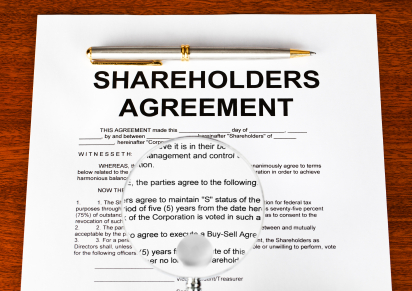This guest post was written by Pablo Mancía, co-founder of Delvy Law & Finance, a Barcelona-based law firm that aims to be a reference when it comes to cover the legal, financial and tax needs of disruptive technology startups and companies.
At the beginning of any startup, founders have great expectations about their business idea and often are convinced that it will be a great success. At this stage many founders forget that it is also important to apply prevention measures to solve complicated situations that may happen. This is why a shareholders’ agreement can assure the legal security of the startup and also help to prevent some situations that may put in danger the growth of the company.
But, what is a shareholders’ agreement?
A shareholders’ agreement is a private contract subscribed voluntarily between all shareholders of a company with the aim of regulating their relationships, rights and obligations, as well as the daily operations of the company.
Here in Spain shareholders’ agreements are not specifically regulated by any law. It has no formal requirements in order to exist or to be valid, it is not necessary to inscribe it at the company’s registry nor before any other public office. Nonetheless, usually the parties decide to have one in order to create a more formal and secure document to sign before a notary.
The content of shareholders’ agreements will depend on the type of project or company we are regulating. It can cover various issues, from day-to-day operations, organization processes, business activities and relationships between the shareholders.
It is important to note that shareholders’ agreements are independent contracts, which means that they are a different type of document that can co-exist with the articles of association of a company.
Why are they important?
A startup path is much like a roller coaster. The future is unknown and in most cases during the first two or three years of the company, many important changes may occur due to various reasons.
A shareholders’ agreement is important because you can use it to foresee certain aspects that can affect negatively the progress or growth of the company. Although it is true that a shareholders’ agreement won’t prevent a problem by itself, it will however regulate how this problem can be fixed and what actions will have to be taken to solve it.
Ultimately, the essence of the shareholders’ agreement is to set the rules for the parties involved in the company, be it founders or investors. The way to achieve this goal is to reach an agreement that will have to be included in a legal document that will be binding for all parties.
We have to keep in mind that it is not only important to set the rules, but also to include which obligations and rights will the parties be granted so the agreement is valid and enforceable. It is essential to receive advice by an expert lawyer on these matters.
Risks of not having a shareholders’ agreement
Not having a shareholders’ agreement would be like walking blindfolded, not knowing what can happen in specific situations which can have a negative effect on the company.
When entrepreneurs claims they don’t need a shareholders’ agreement because they will not have any problems, they ought to think about “what if situations”. Often these are circumstances that are not considered or thought of at the beginning of any venture. Some of these what if? questions might be:
- What if a founder leaves the company?
- What if a founder starts another similar project?
- What if we need a new partner?
- What if a founder is not dedicating enough time or finds another job?
- What if a founder is not delivering what he/she was supposed to do?
- What if there are disagreements between the shareholders?
- What if there’s a deadlock situation?
For all of the above questions and for many others, the shareholders’ agreement should be used as a guide that would tell us how to act and what the consequences would be in these situations. Therefore, not having a shareholders’ agreement would increase the legal uncertainty for both the shareholders and the company itself.
Types of shareholders’ agreements
A shareholders’ agreement can be negotiated at any moment of the company, even when it’s just a project.
We can identify three stages in which a shareholders’ agreement is necessary and important for a startup:
Seed stage
At the seed stage, the shareholders’ agreement will serve to regulate mainly the basic issues regarding the relationship between the founders, starting from their equity stakes, contributions, obligations and roles, their dedication to the company, vesting regulations, etc.
This type of shareholders’ agreement can be negotiated and sign between the founders even before the company is created.
Early stage
At this stage the startup would usually have some time of existence, so a shareholders’ agreement can have the same goals stated above and others, for example when a new founder joins the company or early stage investors back the company. At this stage, two things might happen:
- The company had already a shareholders’ agreement that will need to be modified because of the entrance of the new founder or investor.
- The company had not a shareholders’ agreement so it will be necessary to regulate all the relationships between the parties, as well as include control or economic clauses for the investor.
Growth stage
At the growth stage, companies have usually already validated their business model and have found product/market fit, but are in need of an important cash injection to grow faster and reinforce its position.
At this stage, professional investors of VCs will take the lead in the negotiation of an investment agreement that will become the new shareholders’ agreement between all the parties involved in the operation.
Main clauses in a shareholders’ agreement
The clauses to incorporate in a shareholders’ agreement will depend on the specific context in which this document is elaborated; nonetheless, here are the main clauses divided by group:
- General Clauses: As any agreement, it will have to include the purpose of the document, as well as to indicate the previous agreements made between the parties, indicating their roles, the duration of the contract, law and jurisdiction applicable.
- Operational and organization clauses: in this group we can identify the clauses that regulate the legal structure of the company, appointment of directors and their limitations, the shareholders’ contributions, the roles and functions of each party, dedication, obligations and vesting.
- Clauses regarding shareholders rights and obligations: here we should establish the decision making process, how the shareholders’ meeting will take place, how they will vote, and the compensation that the founders or key collaborators will receive. Also, agreements on how the future benefits of the companies will be treated or invested might also be included.
- Protection clauses: we can identify some clauses of this nature, like founders’ commitments, vesting conditions, non-compete clauses, non disclosure agreements, etc. It is important to include here any clauses that would assure the enforceability of all of the above agreements, as well as foresee possible deadlock situations and how they are going to be solved.
- Exit clauses: these clauses will regulate the economic terms of a future investment in the company or possible exit, drag and tag along clauses, buy out, etc.
It is strongly recommended to look for specialized advice regarding shareholders’ agreements. Everyone involved in the company needs to understand what they are agreeing to, so there can’t be any misunderstandings in the future. We invite everyone interested on this issue to investigate more about it, read blogs and listen to the previous experiences of seasoned entrepreneurs.
Photo | SCY









